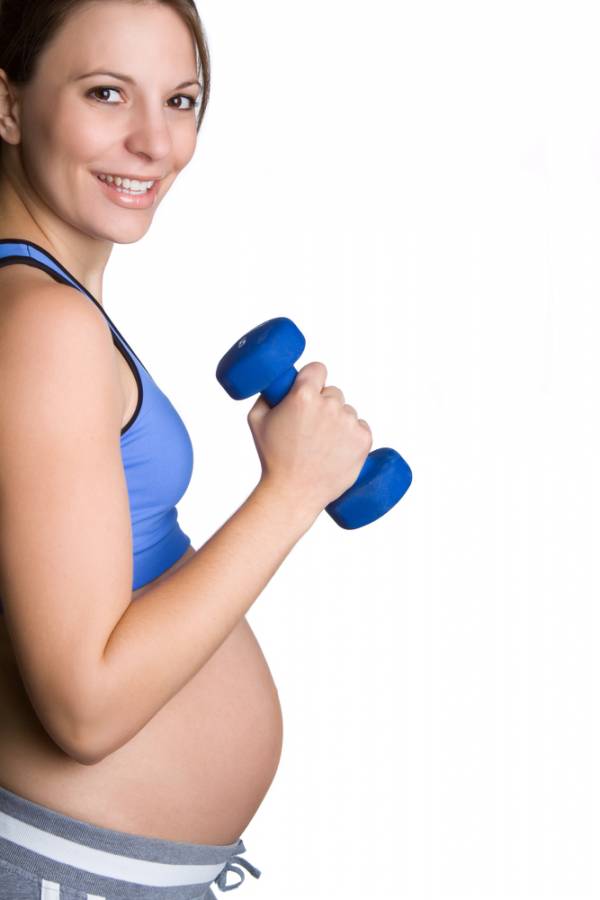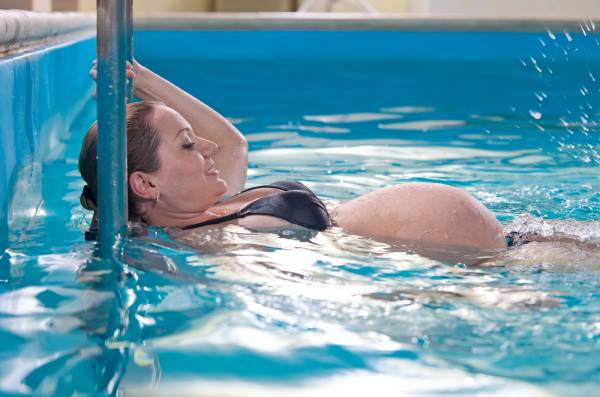I remember my first prenatal appointment vividly. My doctor came in and introduced himself, shaking my hand warmly and congratulating my husband and me with enthusiasm. Then he sat down, folded his hands and looked at me sternly.
“Now that you are pregnant,” he said, “there is one thing you must remember: You are NOT sick.”
The advice seemed strange to me at the time, since I was in the very early stages of my pregnancy and hadn’t experienced any unpleasant symptoms. However, as the weeks went by, my doctor’s advice made more and more sense. I was tired and nauseous all the time. Although I was still indescribably happy to be pregnant, I did start to think of myself as sick or somehow handicapped by these unpleasant symptoms.
Fortunately, my husband encouraged me to keep up with yoga and ballet throughout my pregnancy, and we walked two miles or more together just about every day of the week. By the time I reached the second trimester, I felt better than I ever had before, and was more active than I had been before my pregnancy.
Two years later, I was pregnant again and pursuing a certification in Pre- and Post-Natal Fitness and Nutrition. I was amazed to learn about the benefits of exercise, both before and during pregnancy, for mothers and their babies. But what fascinated me even more was the hypothesis that prenatal exercise can actually improve athletic performance after delivery.
Increasing my own awareness of these benefits motivated me to stay active during my pregnancy. Although modern research has made great progress in recognizing the benefits of exercise during the prenatal period, pregnancy is often still viewed as if it were a crippling ailment. To my mind, pregnant women need the same advice I received during my first pregnancy: “You are not sick.” And I would add to that piece of advice: “In fact, pregnancy has the potential to transform your body in positive ways, even after your baby is born.”
Don’t get me wrong: pregnancy isn’t easy, and shedding baby weight is an infamous challenge. But in those moments of nausea, fatigue and trying to zip up your old non-maternity jeans, it helps to remember that an active pregnancy has the potential to strengthen your body, even after delivery.
Pregnancy’s Effects on Postnatal Performance
 Dr. James F. Clapp III was one of the most prominent pioneers in prenatal exercise. In his book, Exercising Through Your Pregnancy, Clapp claims, “…the combination of exercise and pregnancy has a greater training effect than that produced by training alone.”
Dr. James F. Clapp III was one of the most prominent pioneers in prenatal exercise. In his book, Exercising Through Your Pregnancy, Clapp claims, “…the combination of exercise and pregnancy has a greater training effect than that produced by training alone.”
This may seem like a radical claim, but Clapp supports it with solid evidence. For example, a 2008 study published in the American Journal of Obstetrics and Gynecology found women who continued to do weight-bearing exercise during their pregnancy gained less weight, deposited less fat and had a lower risk of heart conditions than those who did not. The study concluded, “Women who continue weight-bearing exercise during pregnancy maintain their long-term fitness and have a low cardiovascular risk profile in the perimenopausal period.”
Effects on Training
Researchers continue to investigate how and to what extent prenatal exercise can improve performance in the postpartum period. Although there are certainly physiological changes that contribute to these effects, some researchers believe that pregnancy’s effect on training is also related.
In a 2009 article published in The Guardian online, Dr. David James of Gloucester University suggests pregnant women may be less prone to overtraining, a common problem in many serious athletes that can impair performance. According to James, “It is probably the case that most athletes do slightly too much training, not too little. When other priorities come along and they have necessarily to reduce their training a little bit, that might not altogether be a bad thing.”
Overtraining makes athletes more prone to injury and fatigue, and pregnancy presents an ideal opportunity for rest and decreased intensity in athletes who have a tendency to train too hard.
The Bottom Line
Whether you’re a serious athlete or a more casual exerciser, regular physical activity is beneficial for any uncomplicated pregnancy. For serious athletes who are concerned about performance in the postpartum period, research suggests there’s nothing to fear. And if you need further proof, look to real-life examples of mommy world-class athletes, like Kim Clijsters, Paula Radcliffe, Kristie Moore and Catriona Matthew.
 What appears to be more threatening to womens’ health is a sedentary lifestyle during pregnancy. According to Clapp’s studies, women who participated in little or no physical activity during their pregnancy were more likely to experience negative health problems during pregnancy and in the postpartum period.
What appears to be more threatening to womens’ health is a sedentary lifestyle during pregnancy. According to Clapp’s studies, women who participated in little or no physical activity during their pregnancy were more likely to experience negative health problems during pregnancy and in the postpartum period.
Of course, mom isn’t the only one to worry about during pregnancy. Studies also suggest that developing babies benefit from regular prenatal exercise, both during and after pregnancy. Contrary to previous popular belief, exercise does not cause fetal distress or miscarriage in healthy and uncomplicated pregnancies. In fact, babies whose mothers exercise seem to also reap the benefits of mom’s workouts. Infants whose mothers exercise during pregnancy tend to adjust to life outside the womb better and also correlates to lower body fat content after birth, which decreases the chances of obesity later in life.
If your doctor gives you the green light for exercise during pregnancy, take advantage of it. Not only does prenatal exercise make you less likely to experience unpleasant side effects during pregnancy, such leg cramps, nausea, constipation and back pain, but it may also improve performance after your baby is born.
Keep in mind that during pregnancy, a little exercise goes a long way. More than ever, pregnancy is the time to listen to your body, so don’t push it. You may not be able to perform at as high a level as you could before your pregnancy, but rest assured that your baby and your body will thank you for performing at all.






